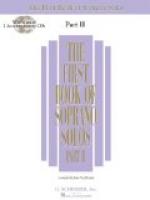“I do not think the ordinary sort is much good,” said Dick, with the air of a connoisseur in religions.
It was to be lamented that the present incumbent at St. John’s had not met with the young man’s very hearty favor. The freshly introduced intoning struck him humorously. He imitated it in ordinary remarks about the house.
“Where’s—my—hat?” he inquired in a whining chant, after the manner of the unfortunate rector’s plaintively intoned “Let us pray.”
Adele, always alive to the ridiculous, laughed; but still she wished he would not be irreverent.
“The way we go through the service,” said Dick, “is so as to relieve it of as much sense as possible. No wonder some of us turn out hypocrites. But you don’t, Adele. However, I’ll reserve my estimate of your case till we see how you hold out at your new gait.”
So Dick watched the “new gait,” and Adele prayed that it might be a walk worthy of the Lord.
Meantime Hubert was pursuing his study of divinity in a normal way—with an open Bible and the Spirit of the Author to interpret. He sought also the fellowship of His people and deep was his perplexity as he found into how many countless sects the “one body” had been divided. Very contrary to the Bible it seemed, but very helplessly he stood before the fact that seemed as hopeless of remedy as of denial. What ought he, one unit among the whole, to do about it? Kindly people sought to draw him into their various fellowships, and he peered into their folds and sought to find the place where his Lord was most honored and His presence most manifest. He found old churches, great and cold, whose service moved with slumbrous calm, and his ardent soul was chilled. He found others where activity bristled and cheerfulness prevailed, but where the world held court as obvious as in the market square; and from these he turned away with a still sharper grief. He found other congregations built in strife and schism, but with some fragrance still of the name of Jesus Christ, and rejoiced that He was preached.
“‘They feared the Lord and served their own gods,’” he said to himself, as almost everywhere he saw the strange mingling of worship of the true God with the too patent service of the gods of pleasure and of wealth.
He found little companies, gathered in protest from shameless worldliness or infidel denial of the Lord, and with them he had sympathy, but still looked hungrily for a fuller expression of the truth than they offered. He found himself in companies where correct, punctilious statements of the truth abounded, and where the most careful zeal sought to restore an apostolic order of worship. But he found that the statements grew dry and juiceless in their formal exactness, and that prescribed form could not insure the animating Spirit without which it was as useless as the phylacteries of the Pharisees. He concluded that truth was deeper and fresher than any definitions of it, as the fountain excels the cistern; and that life was sovereign over form, though in form it embody itself.




